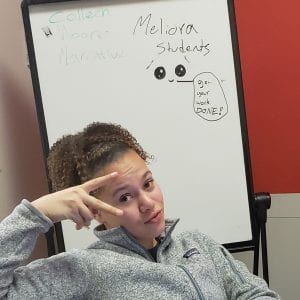‘twixt and ‘tween childhood and adulthood (and how #PBL builds maturity), Part 2
A few moments after the agonizingly drawn-out note-writing experience I describe here, I witnessed (not for the first time!) the mercurial shift of these teens into almost-adults.
Each year, the history students in my #Meliora project-based learning (#PBL) practice create a project to submit to the National History Day (NHD) competition. This year, a group of five students is collaborating on creating a video documentary. The deadline to submit their work for the first round of competitions is eight days away. They have a lot of work to do, as is the case every year about this time, when students realize they are down to the wire.
This afternoon, I sat in on a revision process of the voice-over narrative the students are going to use. The objective of the narrative is to argue their thesis. The quality of their thesis and supporting evidence is what will allow them to advance to the next level of competition. Or not.
The assignment I gave them was to have one student read the narrative aloud while the other students listened. The listeners could stop the narrator at any point and jump in with suggested revisions. My observations:
- One student started reading the narrative, and was having difficulty staying focused enough to read smoothly. Another student stepped in to take over the task. The “hand-off” was done with a friendly, positive attitude by both students.
- Students were listening intently to the narrative flow.
- When students heard something they felt was lacking/incomplete/repetitive, they spoke up immediately and the whole group worked to find a solution.
- There was no defensive or argumentative behavior and they came to consensus efficiently.
These are the moments that inspire me to continue challenging students using PBL. In this one activity, which lasted for about 45 minutes, the students hit all of the touchstones of High Quality Project Based Learning:
- Intellectual challenge and accomplishment. At the beginning of the semester, they spent weeks researching and defining their thesis. Once established, my persistent question to them has been “how does this narrative support your thesis?” That was a question they returned to throughout their review today.
- Authenticity. They had complete choice over their topic, the two constraints being that it relate to Illinois history and that it fit the NHD theme, which this year is “Triumph & Tragedy in History.” This is a requirement of the Chicago History Fair organization, the regional level of entry into National History Fair. Due to this freedom of choice, they have remained highly engaged in conducting research and creating a convincing argument.
- Public product. The students will be presenting their work to a panel of judges in a public forum, which raises the stakes and their desire to create a high-quality product. The stakes (the intensity of competition) will continue to raise as they advance levels.
- Collaboration. Today’s task was completely collaborative. Throughout the project, they have worked both individually and collaboratively toward a common objective, which is persuasively arguing their thesis.
- Project management. They students have been using Trello throughout the project process to identify, assign, and track progress on tasks. Finalizing the narrative is a task they must complete before they can assemble the video documentary, so they understand the criticality.
- Reflection. They were actively and openly reflecting on the narrative composition that had been done to-date. Throughout the project development process, they are required to reflect on how the items they are researching, the books, images, video clips, newspaper articles, etc. contribute to their argument. They assigned team roles and responsibilities early in the project, and have continued to modify them over time, based on the interests and skills of each team member.
I have every confidence a week from now these engaged, enthusiastic students will have a well-argued, well-edited documentary to submit for competition. Because they care.

